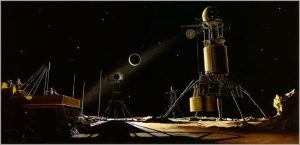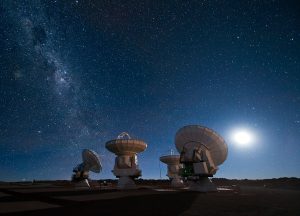Evolution of Space has always captured the imagination of humanity, driving innovation and exploration beyond Earth’s boundaries. The evolution of space technology traces a remarkable trajectory, from the infancy of space exploration to the development of sophisticated technologies that have revolutionized our understanding of the cosmos and expanded the frontiers of human knowledge.
Early Pioneers of Space Technology:

The roots of space technology can be traced back to the pioneering efforts of visionaries such as Konstantin Tsiolkovsky, Robert Goddard, and Wernher von Braun, who laid the foundation for modern space exploration through their research on rocketry, propulsion systems, and astronautics. Their contributions paved the way for the development of rockets, satellites, and spacecraft that propelled humanity into the era of space exploration.
Space Technology in the Space Race:
The Space Race of the mid-20th century between the United States and the Soviet Union heralded a new era of space technology advancements. Iconic achievements such as the launch of Sputnik, the first human spaceflight by Yuri Gagarin, and the Apollo moon landings showcased the power of space technology in pushing the boundaries of human achievement and igniting global interest in the exploration of outer space.
Key Innovations in Space Technology:
Advancements in space technology have led to key innovations that have revolutionized space exploration. From the development of launch vehicles like the Saturn V and Space Shuttle to the deployment of satellites for communication, navigation, and Earth observation, space technology has enabled unprecedented access to space, opening up new frontiers for scientific discovery and exploration.
Remote Sensing and Space Technology:
Evolution of Space plays a vital role in remote sensing applications, using satellites to monitor Earth’s surface, atmosphere, and oceans with unparalleled accuracy. Remote sensing technologies enable the tracking of climate change, natural disasters, and environmental changes, providing invaluable data for scientific research, disaster response, and resource management on a global scale.
Space Technology in Satellite Communications:
Satellite communications represent a cornerstone of modern space technology, facilitating global connectivity through the deployment of communication satellites in orbit. Satellites enable telecommunication networks, broadband internet access, television broadcasting, and emergency communication services, bridging distances and connecting communities worldwide with reliable and high-speed connectivity.
Space Technology in Planetary Exploration:
Space technology has enabled humanity to explore the planets and moons of our solar system through robotic missions and space probes. From the Mars rovers to the Voyager and Cassini spacecraft, space technology has unlocked the mysteries of the cosmos, provided insights into planetary geology, and expanded our understanding of the diverse worlds that populate our celestial neighborhood.
Advances in Spaceflight Technology:

The evolution of space technology has seen significant advances in spaceflight capabilities, with the development of reusable rockets, advanced propulsion systems, and space tourism initiatives. Companies like SpaceX, Blue Origin, and Virgin Galactic are pushing the boundaries of spaceflight technology, aiming to make access to space more affordable, sustainable, and accessible to a broader range of users.
Space Technology and International Collaboration:
Evolution of Space exploration has become a global endeavor, with international collaboration playing a crucial role in advancing space technology. Initiatives such as the International Space Station (ISS), collaborative missions between space agencies, and partnerships in space research and exploration demonstrate the power of cooperation in advancing space technology and achieving shared goals in understanding the cosmos.
Commercialization of Space Technology:
The commercialization of space technology is transforming the space industry, with private companies entering the sector to offer launch services, satellite deployment, and space tourism experiences. Commercial space endeavors are driving innovation, lowering launch costs, and expanding opportunities for scientific research, commercial ventures, and human spaceflight activities in a rapidly evolving space economy.
Future Trends in Space Technology:
Looking ahead, the future of space technology holds exciting possibilities, from ambitious missions to Mars and beyond to the development of advanced propulsion systems, space habitats, and space mining ventures. Technological advancements such as nuclear propulsion, artificial intelligence in space exploration, and sustainable space habitats are shaping the future of space technology, paving the way for new discoveries, collaborations, and opportunities in the vast expanse of space.
Conclusion:
The Evolution of Space technology stands as a testament to human ingenuity, curiosity, and determination to explore the unknown and push the boundaries of scientific discovery. From humble beginnings to the cutting-edge advancements of today, space technology has transformed our understanding of the cosmos, expanded our horizons, and inspired generations to dream of the possibilities that lie beyond Earth. As we embrace the future of space technology, we embark on a journey of exploration, discovery, and innovation that will shape the destiny of humanity in the vastness of space.










